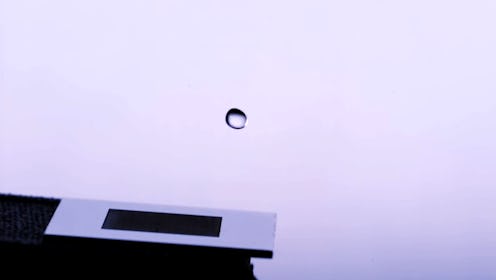News
Watching Water Drops Bounce Is Oddly Mesmerizing

Imagine this worst-case scenario: You spill a tall glass of water right onto your laptop. Now, imagine if the water just bounced right off, leaving your device (and livelihood) bone-dry. That scenario could soon be a reality. Scientists have created a new hydrophobic metal that is so water-repellent it literally makes drops bounce off like bouncy balls. The surface is left virtually untouched by the H2O. This type of metal could be applied in groundbreaking ways, from making airplanes safer to keeping underdeveloped countries more sanitary — and, of course, saving your laptop.
This extremely hydrophobic metal was created by a team of scientists at the University of Rochester. "Hydrophobic" might sound like the state of being deathly afraid of water, but according to Merriam-Webster, it also means "resistant to or avoiding wetting." That was the exact goal for study authors Chunlei Guo and Anatoliy Vorobyev, who used lasers to create the revolutionary surface. In the study, they write:
Here, we demonstrate a laser nano/microstructuring technique to create a combined black, superhydrophobic, and self-cleaning effect on a metal surface.
Guo described what happens when water hits this metal surface to the University of Rochester's Newscenter:
The material is so strongly water-repellent, the water actually gets bounced off. Then it lands on the surface again, gets bounced off again, and then it will just roll off from the surface.
The surface was achieved using a laser technique that "creates an intricate pattern of micro- and nanoscale structures to give the metals their new properties." In the study's accompanying video, Guo says that those structures are "intrinsically part of the material surface." In other words, unlike other existent water-repelling materials, this new surface is not coated with chemicals that will eventually wear off. The water-resistance property is part of the surface itself.
What's more, this surface is significantly more hydrophobic than the chemically coated ones. For example, with Teflon, which is one of the most hydrophobic materials out there today, you have to tilt the surface about 70 degrees for the water to start rolling off, Guo says. With this new surface, you barely have to tilt it at all because the water will bounce right off immediately.
Besides a really easy-to-clean cooking pan, this new superhydrophobic surface can have numerous revolutionary applications, some of which are life-saving.
Anti-Corrosion
Any car owner knows that rust can be extremely damaging and costly. Imagine if your car became virtually invincible to rust because raindrops just bounced off your vehicle instead of pooling and soaking it?
Anti-Biofouling
Biofouling refers to the accumulation of waterborne organisms (bacteria, algae, animals, etc.) on metallic surfaces that contribute to the surface's corrosion. This is a particularly detrimental effect on underwater structures, boats, and other marine vessels. With a superhydrophobic surface, waterborne organisms will not accumulate because the water itself will not accumulate.
Anti-Icing
If water doesn't stick to a surface, then it also won't freeze on that surface. That means you can minimize the dangers that freezing poses with certain parts, such as an airplane fuselage, transmission lines, air conditioners and refrigerator pipes, and telecommunication antennas.
Anti-Microbial
Guo says that when he and his partner developed this new metal, they wanted it to repel not only water but "water containing waste materials." This would be a life-saving application for developing countries, where clean water is extremely scarce. A latrine made with this new hydrophobic material would need very little water for cleaning because it was essentially be self-cleaning.
Watch the video below.
Images: UniversityRochester/YouTube, Getty Images (4)